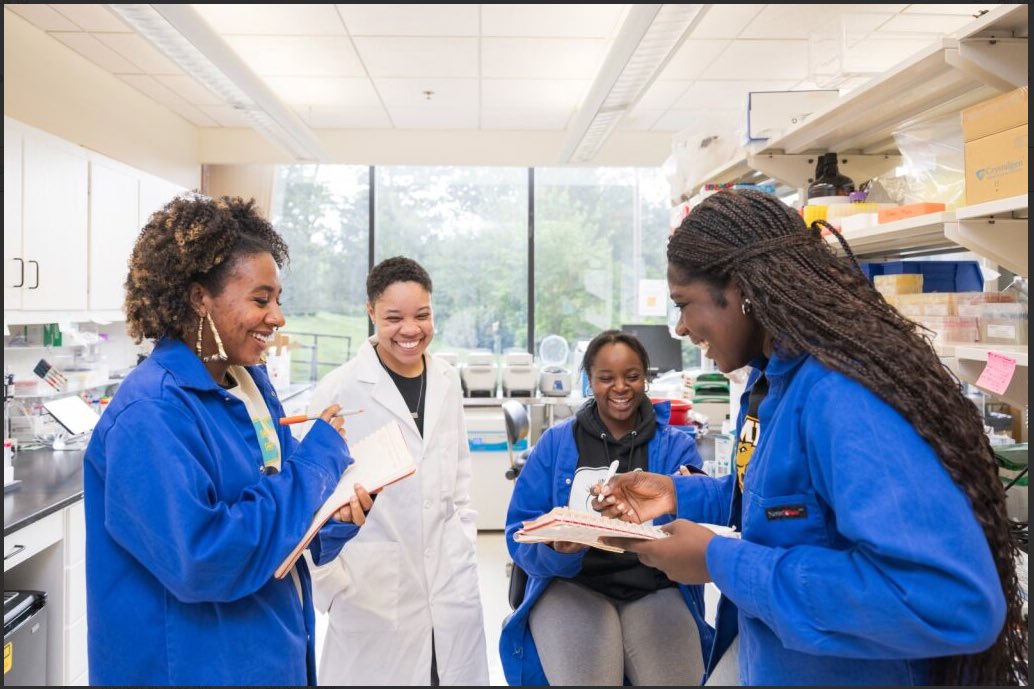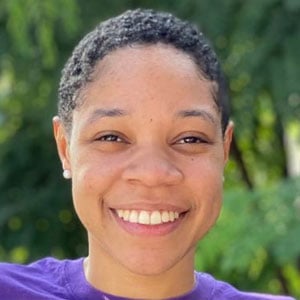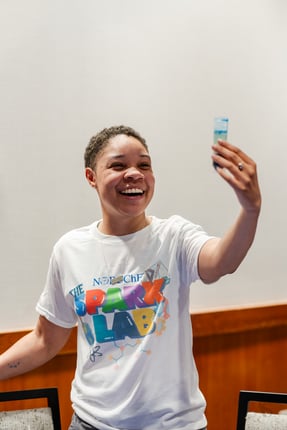October Keystone Symposia Fellow's Spotlight on Dr. Brea Manuel
Our October Keystone Symposia Fellow's Spotlight features Dr. Brea Manuel, a post-doctoral researcher at the University of Maryland, who studies retroviruses like HIV. As a Howard Hughes Medical Institute Postdoctoral Scientist under the mentorship of Dr. Michael Summers, she uses advanced NMR and biophysical techniques to examine retroviral genome packaging with the goal of understanding viral evolution and inspire novel therapeutic strategies against infection.
Her path to this pivotal research role began at Louisiana State University, where she earned her B.S. in Chemistry in 2018. During her undergraduate studies she was awarded the prestigious McNair and LS-LAMP Scholarships for her work investigating anti-HIV small molecules under the mentorship of Dr. Isiah Warner. That formative experience laid the groundwork for her doctoral studies at Emory University, where she was named a Centennial Fellow. There, under Dr. Jennifer Heemstra, Dr. Manuel developed innovative nucleic acid-based tools for biological sensing and therapeutic modulation.
Combining these expertises, her long-term vision is to engineer nucleic acid therapeutics that target pathogenic systems as novel tools against viral infection. She also aspires to be a leader in advocating for inclusive excellence in STEM, and has already made great impacts to this end.
In 2020 she co-authored an influential Nature Reviews Chemistry article that has sparked national conversations around recruiting, retaining, and fostering inclusivity in science.
The chemistry community has the obligation, opportunity and momentum to drive for inclusion in the sciences. Efforts towards that end must begin by allocating opportunities for success on the basis of potential, not privilege, and follow through by soliciting and acting upon feedback from the scholars we have recruited...

Learn more about Dr. Manuel's research, career aspirations and motivations below in the Q&A.
Learn more about the Keystone Symposia Fellows Program!

HHMI Postdoctoral Scientist, Summers Lab
Howard Hughes Medical Institute
University of Maryland, Baltimore County
Briefly describe your research, why it is important, and what motivates you to pursue this area?
My research explores the molecular basis of retroviral genome fate, focusing on Moloney Murine Leukemia Virus (MoMuLV), a distant relative of HIV-1. In HIV-1, genome packaging requires sequestration of the 5′cap, a mechanism that ensures only untranslatable genomic RNA is encapsidated. However, it is unclear whether this strategy is conserved in other retroviruses. My work investigates whether MoMuLV employs a similar cap-sequestration mechanism, thereby probing the conservation of function, rather than sequence or structure, across retroviruses.
This research is important because HIV-1 remains one of the most rapidly evolving retroviruses, capable of developing resistance to antiretroviral therapies. Understanding which molecular features are functionally conserved despite sequence variability can reveal the evolutionary pressures that HIV-1 cannot easily escape, identifying potential long-term therapeutic targets.
I am motivated by a deep curiosity about how viruses preserve essential functions amid constant mutation. By uncovering these conserved molecular principles, I aim to contribute to the broader goal of designing durable antiviral strategies that remain effective even as viruses evolve.
What pivotal moment sticks with you from your experience as a Keystone Symposia Fellow, and how has it impacted you?
As a chemist and chemical biologist by training, I initially found the Scientific Advisory Board meetings quite intimidating; many of the discussions were outside my immediate area of expertise. However, during the January 2024 meeting, I gathered the courage to contribute my perspective. When I later saw my suggestions reflected in the meeting notes and discussed again during the June meeting, it was a pivotal moment for me. It reinforced that even with a different disciplinary lens, my insights had value and impact.
That experience not only boosted my confidence but also deepened my appreciation for interdisciplinary collaboration, showing that diverse scientific voices truly strengthen the collective conversation.
What prompted you to apply for the Fellows Program and how do you expect it to help shape your career?
I aspire to become a tenure-track professor in chemical biology and biochemistry. I applied to the Keystone Symposia Fellows Program because I recognized it as a unique opportunity to gain mentorship and professional development that would directly support that goal. The Fellows Fridays have provided invaluable insight into navigating academic transitions, while the mentorship component has been truly transformative. My mentor, Dr. Elizabeth Villa, has been incredibly generous with her time and guidance, offering to review my materials and providing thoughtful feedback as I prepare applications for transition awards such as the K99/R00 and the Burroughs Wellcome Fund CASI Award.
Through this program, I’ve gained both the confidence and the practical tools to take the next step toward independence as a scientist and educator.
What are your thoughts on the importance of mentorship? How has your Keystone mentor influenced you and your career? How do you act as a mentor for your community?
Mentorship is essential for success, whether it’s having someone help you interpret the nuances of a contract, navigate a difficult professional relationship, write a grant, or decide between two opportunities. Every major decision in science involves some degree of guidance and perspective, and interestingly, all of my mentors have mentors themselves. I think that speaks volumes about how foundational mentorship is at every career stage.
My Keystone mentor, Dr. Elizabeth Villa, has been incredibly impactful. She provides candid, thoughtful advice and has offered to review my materials as I prepare for transition awards such as the K99/R00 and the Burroughs Wellcome Fund CASI Award.
Her mentorship has shown me what it means to invest in someone’s success with both care and accountability, and it’s inspired me to be intentional in how I mentor others.
Within my own community, I actively mentor through leadership and direct engagement. I currently serve as the Northeast Regional Chair of the National Organization for the Professional Advancement of Black Chemists and Chemical Engineers (NOBCChE), where I oversee programming and engagement across the region, and as an appointed member of the American Chemical Society (ACS) Committee on Minority Affairs (CMA), where I serve on the Awards Committee to help elevate underrepresented chemists. In the lab, I mentor six undergraduate students who assist with our ongoing research projects, helping them build technical skills, scientific curiosity, and confidence. Across these roles, I try to embody the kind of mentorship that has shaped my own path: accessible, empowering, and rooted in community.
How has being a Keystone Symposia Fellow helped shape your career?
Being a Keystone Symposia Fellow has been truly transformative for my career. Because of my participation in the program, I was invited to apply for the Leading Edge Symposium Fellowship and was later selected as one of the fellows. Through the Fellows network, I also learned about the NPA IMPACT Fellowship, another highly competitive program, in which I was chosen as one of six fellows nationwide. These opportunities have expanded both my professional network and my visibility as an emerging independent scientist.
In addition, I was selected as one of 18 speakers for the 2025 Stanford·Berkeley·UCSF Next Generation Faculty Symposium, where I was delighted to share the stage with two of my Keystone Fellows colleagues, Dr. Juan Inclan-Rico and Dr. Colwyn “CoCo” Headley. Seeing other Keystone Fellows in these spaces underscored how powerfully the program connects and elevates future leaders across disciplines.
Equally impactful have been the Fellows Fridays and the mentorship component of the program. The professional development sessions have provided practical, candid insight into navigating the transition to independence, while my mentor, Dr. Elizabeth Villa, has been instrumental in guiding me through the preparation of my transition award materials (e.g., K99/R00 and Burroughs Wellcome Fund CASI).
Altogether, Keystone has opened doors I could not have imagined, and has given me the confidence, mentorship, and community to walk through them.

Connect with Dr. Brea Manuel on LinkedIn, or X/Twitter
Keystone Symposia Fellows Program
Keystone Symposia Health Equity Initiatives
.png?width=6000&height=3375&name=newsletter-header-%20fellows%202025%20(2).png)

Related news
December Fellow's Spotlight on Dr. Christian Cazares
December's Fellows Spotlight goes to Keystone Symposia Fellow Dr. Christian Cazares. Dr. Cazares is...
Keypoint Newsletter: Fall 2024 Conference Highlights & Enhanced Programming
We wrapped up the year with a handful of Fall conferences at home and abroad, spanning Colorado to...
Welcoming the Keystone Symposia Fellow's Class of 2026!
By Jill Abrell
Keystone Symposia is pleased to welcome our Fellows Class of 2026 – an esteemed...



.png)
-1.png)
.png)